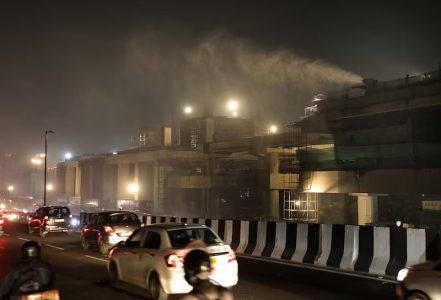A “vicious cycle” of climate change, pollution and wildfires is putting the world’s health and food supplies at risk, weather forecasters have warned.
Intense heat and droughts in the first eight months of 2024 have increased the risk of fires and air pollution, the World Meteorological Organisation says.
Air pollution can slash crop yields as much as 15 per cent, according to scientists, by blocking sunlight and tampering with plants.
Wildfires in turn damage plants and crops, leading to more carbon emissions, said WMO scientist Lorenzo Labrador, completing the vicious circle.
The Middle East and North Africa have some of the world’s highest levels of air pollution, which also affects human health, clean water and wildlife.
The WMO, whose president is UAE meteorologist Dr Abdulla Al Mandous, said in an annual bulletin that air quality is “strongly interconnected” to global warming.
“Climate change and air quality cannot be treated separately. They go hand-in-hand and must be tackled together,” said the WMO’s secretary-general Ko Barrett. “Climate change means that we face this scenario with increasing frequency.”
A particular concern of scientists is particulate matter in the air, which can occur naturally from desert dust but also from human activity such as farming and industry.
World Health Organisation data analysed by The National reveals that cities in the Eastern Mediterranean region, which includes the Gulf and North Africa, have the highest average concentration.
However, last year saw lower than usual dust emissions over the deserts in the Arabian Peninsula and large parts of North Africa, the agency said.
By contrast, air pollution was unusually high over India, due to what experts said was an increase in industrial emissions.

Experts at the 187-nation organisation warn that India, Pakistan and parts of Africa are among “hotspots” where pollution can affect farming.
The particulate matter “can reduce crop productivity in areas where maximising yield is of crucial importance for feeding the population”, according to the WMO’s bulletin.
“Agriculture is itself a major contributor to [pollution] through release of particles … by stubble burning, fertiliser and pesticide applications, tillage, harvesting, and manure storage and use.
“These particles can affect crops growing nearby or may be transported tens to thousands of kilometres in the atmosphere, affecting distant crops.”
Air pollution was down in China and Europe thanks to lower emissions from human activity, according to meteorologists.
Wildfire threat
Last year brought “hyper-active wildfire seasons” around the world which release a “noxious mix” of chemicals, WMO scientists say.
More than 250 forest fires were reported in Tunisia while at least 34 people were killed in Algeria as the danger spread across North Africa last summer.
Southern Lebanon has witnessed a spread of dangerous fires in 2024, compounded by the tense military situation and incendiary equipment.
Wildfires have many causes but “climate change also has an indirect role by increasing the frequency and intensity of heatwaves and prolonging drought”, says the agency’s report.
“These conditions heighten the risk and likelihood of forest fires spreading, which in turn has a major impact on air quality.”
The WMO suggests planting trees or shrubs to physically shelter crops from local air pollution. These would also store carbon dioxide, bringing climate benefits.
More research is needed to improve predictions of future crop yields by accounting for the twin effects of changing air quality and climate, it says.



